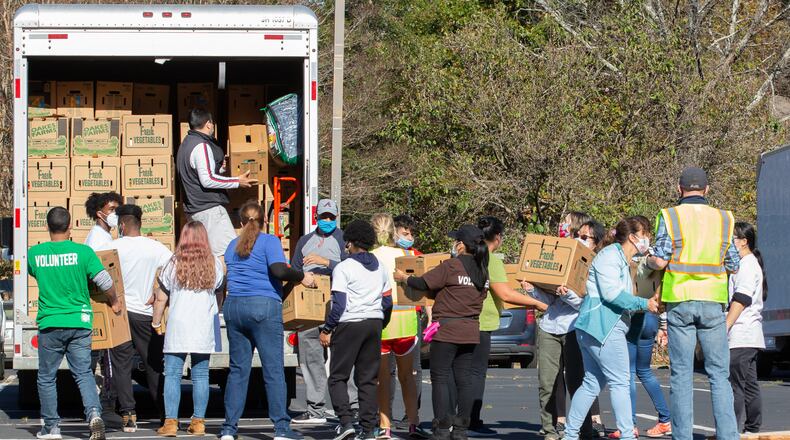In mid-March, days before Georgia would shut down because of the emergence of the coronavirus pandemic, a handful of Gwinnett County non-profit leaders gathered at 12Stone Church.
“We said, ‘This thing might get pretty big,” said Randy Redner, president and CEO of the Community Foundation for Northeast Georgia.
They sat in a meeting room and scribbled on a whiteboard as they thought of what the next few weeks might hold.
“Instantly, we knew, we’re going to need more food. We’re going to need more volunteers, and we’re going to need more money,” Redner said.
What they also needed was an easy way for people in need — and people looking to provide help — to find them. There had been a number of local groups specializing in issues like homelessness, food insecurity, education and health care — known collectively as “human services” — working together for about four years to try and maximize their impact in Gwinnett through collaboration, Redner said. They decided to gather under the umbrella of Gwinnett Cares, a new hub for non-profit services that would help people affected by the pandemic.
Credit: Steve Schaefer
Credit: Steve Schaefer
“Our goal was not to reinvent the wheel, but identify what our strengths were, where our weaknesses are, and where we needed to fill in the gaps,” said Paige Havens, a marketing consultant who has been working with Gwinnett Cares from its inception. “Working together instead of working in our own silos has made a difference tremendously in how we can affect our community.”
Since March, Gwinnett Cares has grown to a network of more than 200 non-profits, faith-based organizations, private companies and local governments. Dozens of events are hosted through Gwinnett Cares each month; more than 20 food drives and resource pickups with free food, clothing and personal care items are scheduled for the week of Thanksgiving alone.
Gwinnett Cares also serves as an online portal for a myriad of resources, including job boards, affordable childcare options and applications for housing assistance.
In those first few months, the primary need was food, Redner said. As Gwinnett’s unemployment rate jolted from 3% in January to 12% in March, the need for food pantry assistance spiked alongside it. The Community Foundation began a fundraising effort with an initial goal of $300,000, and raised nearly $1.1 million in 60 days, Redner said. Gwinnett’s food pantries had to stock up on supplies, recruit more volunteers and quickly change their distribution methods in order to minimize contact between recipients and volunteers. The drive-thru method, in which groceries are loaded into a recipient’s trunk or backseat without any person-to-person contact, was quickly adopted.
Credit: Steve Schaefer
Credit: Steve Schaefer
“Our entire food system was built on a system where people got out of their cars and walked into our buildings. We couldn’t do that,” Redner said. “All of our food partners flipped to mobile in a week or less.”
Multiple cooperative ministry groups have worked with Gwinnett Cares to hold regular food, clothing and personal care item distributions. They’ve been giving out seven times as many items as they were before the pandemic struck, Havens said.
As it became clear that the pandemic would last more than a few weeks, Gwinnett Cares expanded its footprint. They added a workforce development team and held virtual and drive-thru job fairs. A multicultural group was created to ensure appropriate resources were getting to communities that primarily speak a language other than English, including the county’s large Latino and Korean communities.
“You go from relief work to recovery work,” Redner said. “Relief work is what’s right in front of you and the recovery is a little bit longer.”
The looming recovery challenge in Gwinnett is an expected deluge of eviction proceedings when the federal eviction moratorium expires Jan. 1. Evictions were first halted under the CARES Act in mid-March. A September order from the Centers for Disease Control and Prevention, extended the moratorium through the end of the year. Neither action forgave rent that went unpaid during the moratoriums.
Some eviction proceedings in Gwinnett have resumed, and representatives from HomeFirst Gwinnett, a homelessness and affordable housing initiative, have been at the courthouse every week to help those facing eviction. HomeFirst partnered with Gwinnett County on Project RESET, which will use CARES Act funds to pay past due rent for up to 400 families. The funds must be used by the end of 2020, before the moratorium ends and an influx of eviction proceedings are expected. For those who may face eviction in 2021, HomeFirst will work with Gwinnett Cares’ workforce development team to help people get back on their feet and able to pay down some of their overdue rent, said Matt Elder, HomeFirst’s director.
The partnerships through Gwinnett Cares are making it more efficient for people to find and give help, Elder said.
“It’s truly been a public, private, faith-based, non-profit effort. It’s not just effective, but incredibly impactful for the people in the community who most need it,” Elder said. “These are individuals and organizations that have risen up to meet an unprecedented need that nobody could’ve known was coming.”
About the Author
The Latest
Featured




